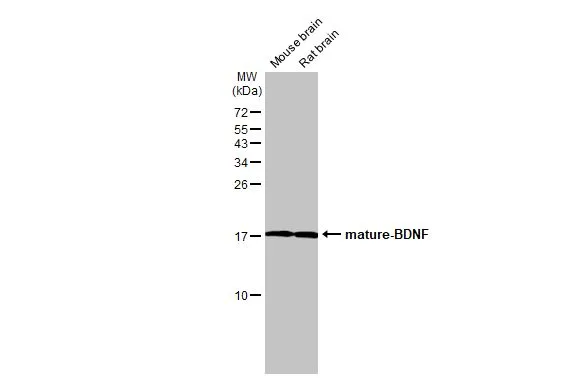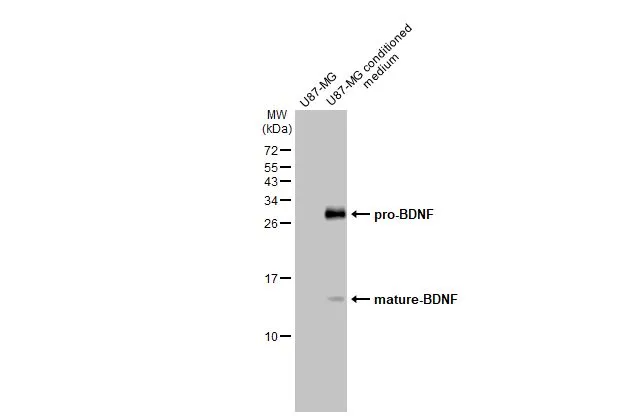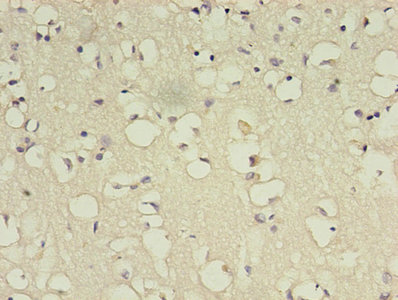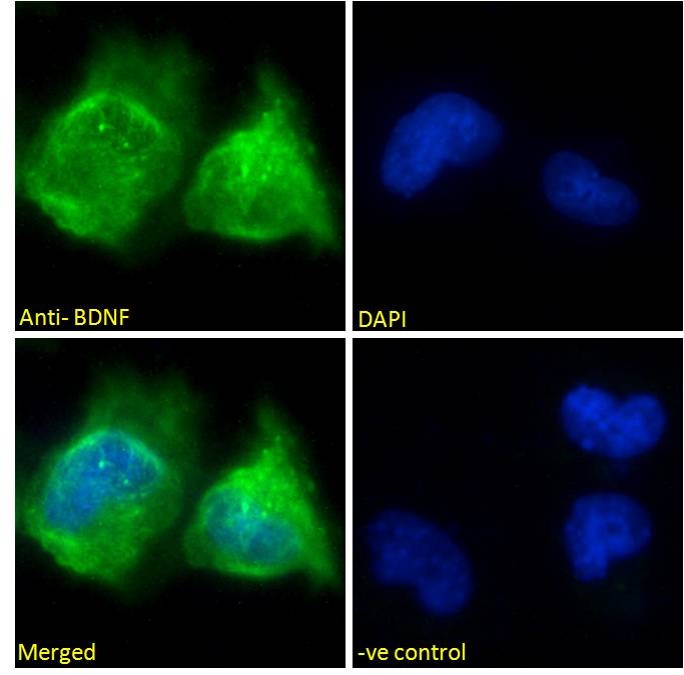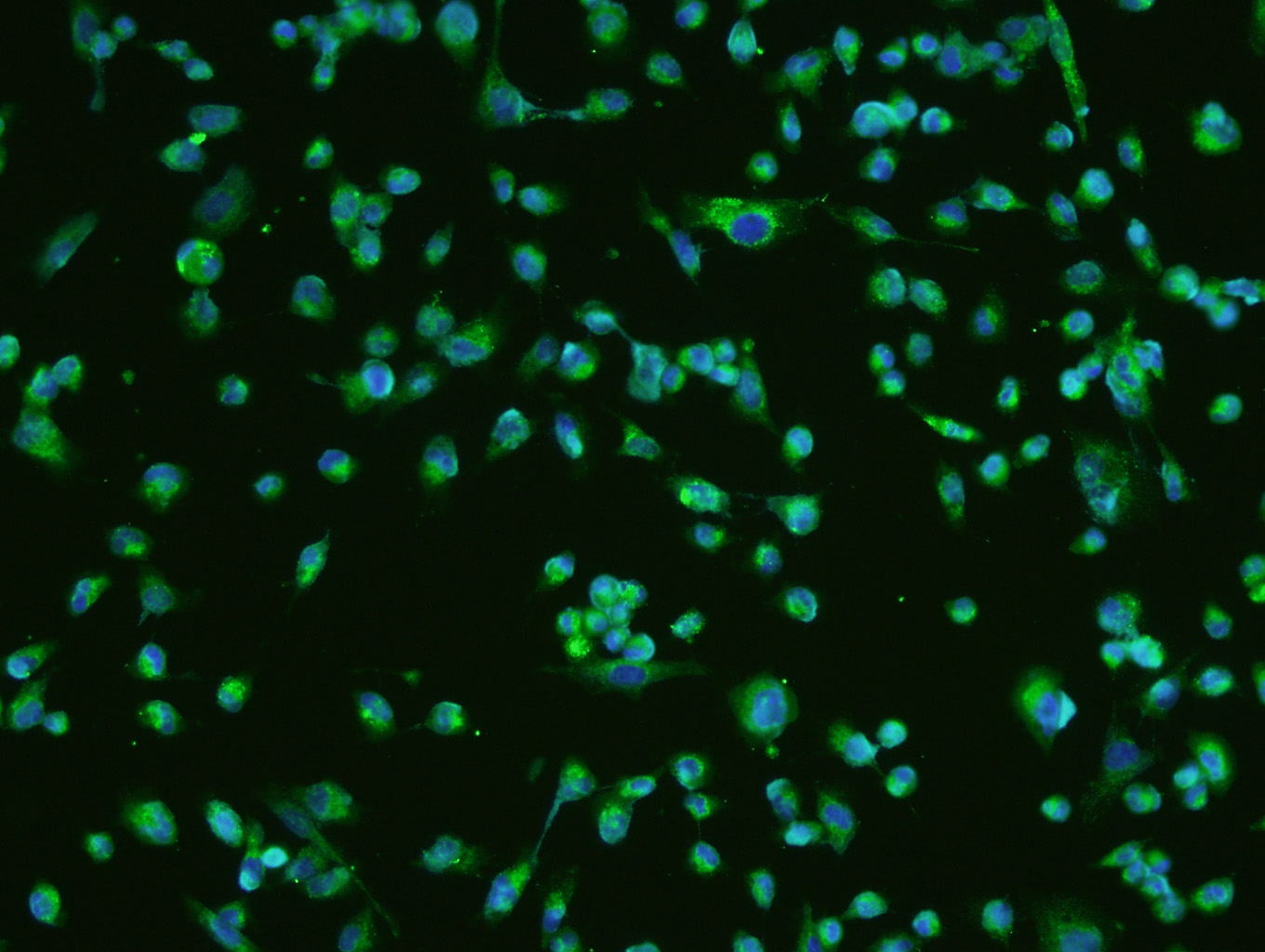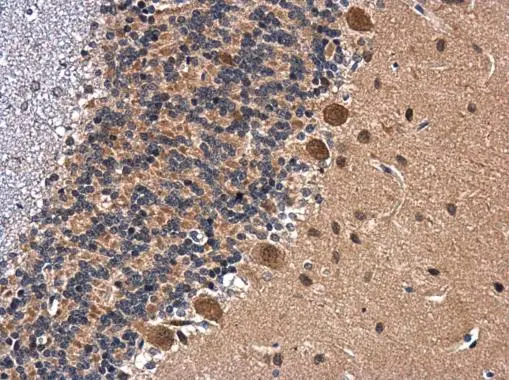
BDNF antibody detects BDNF protein at cytoplasm in rat brain by immunohistochemical analysis. Sample: Paraffin-embedded rat brain. BDNF antibody (GTX132621) diluted at 1:500.
Antigen Retrieval: Citrate buffer, pH 6.0, 15 min
BDNF antibody
GTX132621
ApplicationsImmunoFluorescence, Western Blot, ImmunoCytoChemistry, ImmunoHistoChemistry, ImmunoHistoChemistry Frozen, ImmunoHistoChemistry Paraffin
Product group Antibodies
ReactivityHuman, Mouse, Rat
TargetBDNF
Overview
- SupplierGeneTex
- Product NameBDNF antibody
- Delivery Days Customer9
- Application Supplier NoteWB: 1:500-1:3000. ICC/IF: 1:100-1:1000. IHC-P: 1:100-1:1000. *Optimal dilutions/concentrations should be determined by the researcher.Not tested in other applications.
- ApplicationsImmunoFluorescence, Western Blot, ImmunoCytoChemistry, ImmunoHistoChemistry, ImmunoHistoChemistry Frozen, ImmunoHistoChemistry Paraffin
- CertificationResearch Use Only
- ClonalityPolyclonal
- Concentration1.96 mg/ml
- ConjugateUnconjugated
- Gene ID627
- Target nameBDNF
- Target descriptionbrain derived neurotrophic factor
- Target synonymsANON2, BULN2, neurotrophic factor BDNF precursor form, abrineurin, neurotrophin, proBDNF
- HostRabbit
- IsotypeIgG
- Protein IDP23560
- Protein NameNeurotrophic factor BDNF precursor form
- Scientific DescriptionThe protein encoded by this gene is a member of the nerve growth factor family. It is induced by cortical neurons, and is necessary for survival of striatal neurons in the brain. Expression of this gene is reduced in both Alzheimers and Huntington disease patients. This gene may play a role in the regulation of stress response and in the biology of mood disorders. Multiple transcript variants encoding distinct isoforms have been described for this gene. [provided by RefSeq]
- ReactivityHuman, Mouse, Rat
- Storage Instruction-20°C or -80°C,2°C to 8°C
- UNSPSC41116161

![BDNF antibody detects BDNF protein by immunofluorescent analysis. Sample: DIV10 rat E18 primary cortical neuron cells were fixed in 4% paraformaldehyde at RT for 15 min. Green: BDNF stained by BDNF antibody (GTX132621) diluted at 1:500. Red: Tau, stained by Tau antibody [GT287] (GTX634809) diluted at 1:500. Blue: Fluoroshield with DAPI (GTX30920). BDNF antibody detects BDNF protein by immunofluorescent analysis. Sample: DIV10 rat E18 primary cortical neuron cells were fixed in 4% paraformaldehyde at RT for 15 min. Green: BDNF stained by BDNF antibody (GTX132621) diluted at 1:500. Red: Tau, stained by Tau antibody [GT287] (GTX634809) diluted at 1:500. Blue: Fluoroshield with DAPI (GTX30920).](https://www.genetex.com/upload/website/prouct_img/normal/GTX132621/GTX132621_43552_20191125_ICC_IF_R_w_23060523_650.webp)
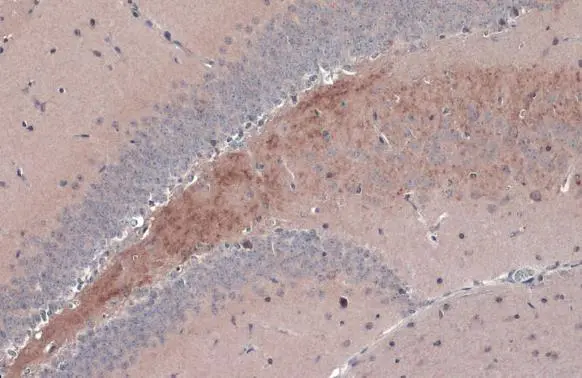
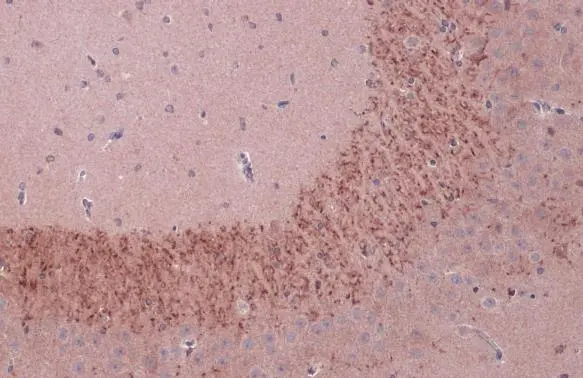
![BDNF antibody detects BDNF protein expression by immunohistochemical analysis. Sample:Paraffin-Embedded adult mouse retina. Green: BDNF protein stained by BDNF antibody (GTX132621) diluted at 1:250. Red: beta Tubulin 3/ TUJ1, stained by beta Tubulin 3/ TUJ1 antibody [GT11710] (GTX631836) diluted at 1:500. Blue: Fluoroshield with DAPI (GTX30920). BDNF antibody detects BDNF protein expression by immunohistochemical analysis. Sample:Paraffin-Embedded adult mouse retina. Green: BDNF protein stained by BDNF antibody (GTX132621) diluted at 1:250. Red: beta Tubulin 3/ TUJ1, stained by beta Tubulin 3/ TUJ1 antibody [GT11710] (GTX631836) diluted at 1:500. Blue: Fluoroshield with DAPI (GTX30920).](https://www.genetex.com/upload/website/prouct_img/normal/GTX132621/GTX132621_42529_20170522_IHC-P_M_w_23060523_250.webp)
